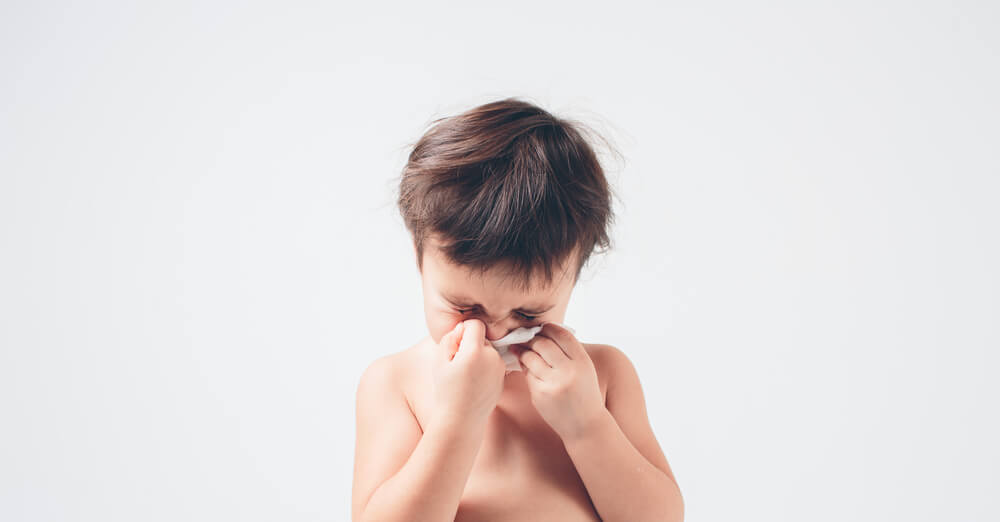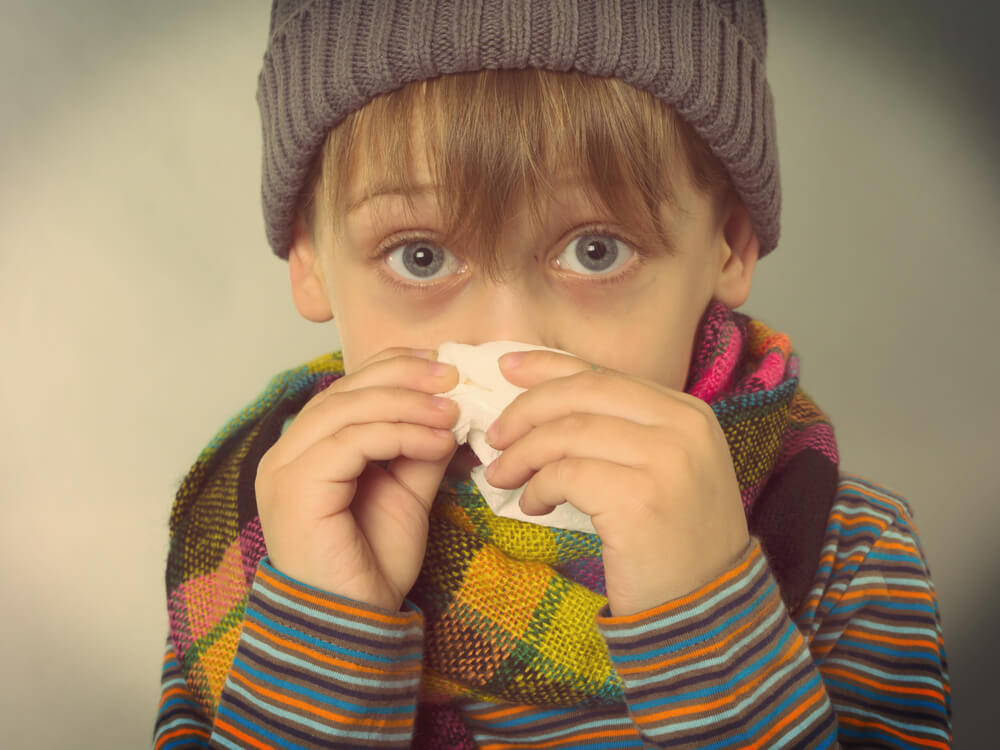
It’s that time of year again! Before you know it, the weather will be changing and sinus infection in kids will be commonplace. The rapid change in weather coupled with the underdeveloped sinuses of children makes them especially susceptible to pediatric sinusitis. Very often, it is hard to diagnose it in children because it sometimes appears to be caused by other issues like allergies or other viral illnesses.
Pediatric Sinusitis Defined
Pediatric sinusitis is defined as inflammation or infection of the sinuses of children. At birth, children have two pairs of sinuses called ethmoid and maxillary sinuses. Ethmoid sinuses are located around the bridge of the nose. Maxillary sinuses are located around the cheeks. Other sinuses that develop at later ages and are susceptible to sinusitis include frontal and sphenoid sinuses. Frontal sinuses typically develop around the age of 7 and are located in the forehead right behind the eyes. Sphenoid sinuses don’t develop until the teen years and can be found deep behind the nose.
Sinusitis is caused by any blockage of the drainage pathways of the sinuses. When this occurs, mucus can become trapped and can lead to infection. Sinusitis can take three different forms that include acute or short term sinusitis, chronic or long term sinusitis, or recurrent sinusitis.
Some of the risk factors for chronic sinusitis in child-developing years can include:
- Nose injury
- Tooth infections
- The nose has an abnormal shape
- The nose has a foreign object
- An abnormal birth defect that affects the roof of the mouth like cleft palate
- Stomach acid issues
At times, it is a challenge to tell the difference between a sinus infection and a common cold. One way to tell the difference is if the symptoms worsen after a week to ten days. Colds usually improve during this time but sinus infections do not. Some of the most common sinus infection symptoms in kids are:
- Stuffy nose
- Fever
- Bad breath
- Facial swelling
- Headache
- Cough
- Runny nose
- Postnasal drip
- Loss of smell
- Pain and soreness over sinuses
Although children with chronic sinusitis have less severe symptoms, they tend to last much longer than acute sinusitis. Recurrent sinusitis comes back multiple times in the same year. Some of the other causes of sinus infection in toddler years include Streptococcus pneumonia, Haemophilus influenzae, and Moraxella catarrhalis. These big words are mostly responsible for acute sinusitis and are common bacteria that cause sinus blockage.
Prevention and Treatment of Sinus Infection in Kids

By now, you may be wondering how you can prevent sinus infection in kids. The good news is that a few precautionary measures can go a long way. Small and simple lifestyle changes can improve your child’s chances of avoiding a sinus infection:
- Use saline sprays, washes, or both if necessary. Use as often as you can to keep the nose as moist as possible.
- Use a humidifier to keep humidity between 40% and 50% in the home to stop dry air from irritating your child’s nose and preventing infection. Cleaning your humidifier on a regular basis will prevent germs and other bacteria from growing and prolonging your child’s sickness.
- Make sure to keep cigarette and cigar smoke away from your child, as this can be an additional irritant to their sinuses.
- Avoid activities that include forcing water into your child’s nose, like swimming. For this reason, you should also limit the time they spend in chlorinated water.
- Emphasize increased hygiene like hand washing.
- At this time, your child’s immune system is compromised so it is a good idea to be up to date on your vaccinations.
- Keep your children away from individuals with colds or other upper respiratory infections.
Treating your child’s sinusitis will need a comprehensive approach from your doctor and home remedies. It’s always good to call the doctor if the infection lasts longer than 10 days with no improvement. Your pediatrician may prescribe antibiotics, allergy medication, corticosteroid medication, or surgery. Antibiotics will aggressively address the infection and stop it in its tracks since they kill the bacteria causing the infection. If the infection does not improve within 3 to 5 days, your doctor may prescribe a different antibiotic.
Allergy medicines and immunotherapy are effective for those infections caused by allergies. In this case, your child may be referred to an ENT or ear, nose, and throat specialist for further tests and treatments. Sometimes, a doctor will do a thorough analysis that may include your child’s sinusitis history, immune system issues, and structural changes. The diagnosis may involve the use of CT scan and X – rays if there are complications as a result of the infection. However, this is not typical due to safety concerns regarding the use of radiation on children younger than 6 years old.
Surgery may sound extreme but may be necessary depending on the severity of the infection. This option is usually only used on a small percentage of children that have not responded well to medical therapy. In this circumstance, a doctor may recommend the removal of adenoid tissue. Infection of the adenoid tissue, also referred to as adenoiditis, is an infection of the back of the nose that causes blockage and causes many symptoms similar to sinusitis.
Sometimes, in more severe cases, adenoidectomy is necessary. An ENT surgeon can open natural drainage passages in your child’s sinuses to widen them, allowing for antibiotics to be directly administered to the bacteria causing the infection. Doing so will reduce the number and severity of the infections.
Other care that may be recommended can include fluids, saline washes, and warm compresses. All of these options can be done in conjunction with your doctor’s prescribed medications for faster healing. Drinking water every hour can make a huge difference in thinning out any mucus and helps prevent dehydration. Saline washes are ideal for keeping the nasal passages open and washing out any thick mucus or debris that could be causing the blockage.
Get the Most Out of Your Doctor Visit
Making the decision to bring your child to the doctor is a good one. At Kings Bay Pediatrics, our board-certified physicians and high-quality medical professionals will be able to answer any questions you may have. We’d like to suggest some pointers to get the most out of your visit with us that might help in maximizing your child’s sinusitis treatment.
- Have a full understanding of your visit and what you want the results to be
- Write down some questions you may have before the visit so that you are better prepared
- When you are at the appointment, make sure to write down the diagnosis, any new medicines or treatments mentioned, and tests to be administered. Make sure to document any instructions that are given as well.
- Have a good understanding of why the doctor may have prescribed a new medicine or treatment and know what the side effects are for either.
- Inquire if there are other options available for your child’s condition
- Understand why a test or procedure has been recommended.
- Any follow up appointments and treatments should be written down including the date, time, doctor, and purpose
- Have a list of after-hours contacts and numbers in case of an emergency or if you need additional advice or information
Book an Appointment with the Pediatrician Today
We’ve given you a lot of information to process. However, these are helpful tips to get you started in the right direction. With over 40 years in practice, you can rest assured that we will take great care in treating your child’s sinus infection. As experts in pediatric care, our commitment to providing outstanding and personalized care from birth to 21 years can be seen in our service to Broward County, Florida Keys, and beyond. Book your next pediatric appointment with us today!


